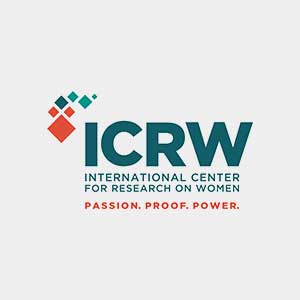The International Center for Research for Women (ICRW) is a global research institute, with regional hubs in Washington D.C., United States; New Delhi, India; Kampala, Uganda; and Nairobi, Kenya. Established in 1976, ICRW conducts research to identify practical, actionable solutions to advance the economic and social status of women and girls around the world.
ICRW works on a range of issues such as inadequate access to education and livelihoods, adolescent empowerment, gender-based violence, masculinities, HIV, and violence against women and girls. ICRW has worked toward centering the rights of women and creating evidence to understand their position within the ecosystem of work and the care economy through several projects. The organisation has also focused on strengthening of existing state and private sector platforms for realisation of women’s citizenship’s rights, exploring evidence on women’s access to financial inclusion, and creating sector-specific knowledge, for instance, the manufacturing sector in Kenya, women as entrepreneurs in Denmark, inclusive growth of micro, small, and medium enterprises (MSMEs) in India and interlinkages between clean energy initiatives and gender in Tanzania.
Through its research, ICRW Asia has focused on nature of employment, employability of girls and women, and creation of pathways for their economic empowerment by engaging with stakeholders in the ecosystem — peers, parents, teachers, community members, local businesses and skilling institutes. The VIKALP Exploratory Study on Women in Non-Traditional Livelihoods was an extensive project that unpacked and explored enablers and barriers for women in non-traditional livelihoods in India. As part of the project, ICRW Asia also developed a report mapping policies, schemes and private sector initiatives that shape opportunities for women. At present, the organisation is engaged in research and analysis of gendered impacts of COVID-19 — including deepening gender inequalities, economic vulnerabilities, risk of GBV and restricted access to SRH services — on female workers in informal urban economies.

